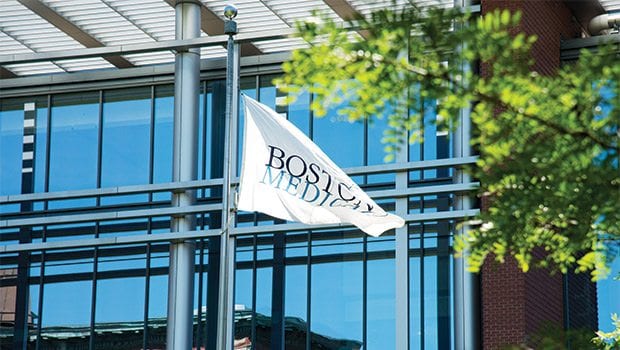
When asked during a recent interview the best way for the nation to combat the opioid epidemic, the response by Kate Walsh, the president and CEO of Boston Medical Center, was to the point. “Reduce the stigma,” she said. “We must reduce the stigma and provide access to services.”
It is not unusual for a segment of the population to be ignored or shunned. People who look different or practice an unfamiliar religion are often viewed with distrust or scorn. As Rudyard Kipling put it, “All the people like us are we, and everyone else is they.” People who use drugs, however, face a particularly harsh form of stigma, according to Alicia Ventura, director of operations and special projects for BMC’s Office-Based Addiction Treatment (OBAT) program. “Studies have shown that addiction is the most stigmatized health condition in the world,” she explained.
Stigma is rarely based on fact. Rather, it is fueled by misperceptions and generalizations. Yet, it can have dire consequences. “Stigma is a major barrier to people seeking care for substance use disorders, and oftentimes prevents people from seeking care until they are very ill and have experienced negative consequences of their substance use,” said Ventura. “Not only does this delay in care result in long periods of unnecessary suffering for individuals and families, but it also means that by the time many people engage in care, their substance use is more severe and therefore more difficult to treat.”
In 2015 an estimated 22 million people aged 12 or older used drugs, according to a 2016 report from the Substance Abuse and Mental Health Association. However, only 11 percent, or 2.3 million, received evidence-based substance use treatment. The impact of non-treatment can be severe. In 2016, more than 50,000 people in the United States died from accidental opioid overdose. Of that number, close to 2,000 deaths occurred in Massachusetts alone—nearly five people per day statewide.
Stigma originates from several fronts. The general public, families and friends have spurned people suffering from the disease. Even the medical community at one time considered drug addiction a moral lapse rather than a mental health or medical disorder.
Treatment is available
The obstacles to treatment for substance use are slowly being lifted. The Affordable Care Act lists treatment for substance use disorder as one of the ten essential health benefits. The medical profession recognizes it as a chronic disease of the brain instead of a moral weakness. In Massachusetts, more police departments are choosing referrals to treatment programs rather than arrests.
For roughly 25 years Boston Medical Center has assumed the mantle of reducing the stigma of drug addiction as well as providing access to services. Through its multiple programs BMC has taken the lead in not only the diagnosis and treatment of drug addiction, but also in training and research, with measurable success. For instance, the Inpatient Addiction Consult Service has been found to reduce visits to the emergency department by roughly 30 percent. Readmission rates by high-risk patients have dropped by about 40 percent.
The OBAT program is a collaborative care model that relies on nurse managers to deliver addiction treatment within primary care clinics similar to the way other chronic health conditions are treated, explained Ventura. The program also is integrated into BMC’s specialty outpatient clinics, such as Project RESPECT, a regional referral center for pregnant women with substance use disorders and, CATALYST, BMC’s interdisciplinary primary-based program for adolescents and young adults. In addition, BMC has partnered with the Boston Public Health Commission in a new program called Faster Paths, which offers immediate access to treatment through the hospital’s emergency department.
BMC recently received a significant donation in support of its efforts in combatting addiction. The $25 million gift – the largest in the hospital’s history – from the Grayken family creates the BMC Grayken Center for Addiction Medicine, which will allow BMC to move forward in providing an integrated approach to the opioid epidemic with emphasis on treatment, training, prevention and research.
The stigma of drug addiction is a public health issue. BMC is at the forefront of educating the community and future providers in order to change the public’s perception about the disease.






